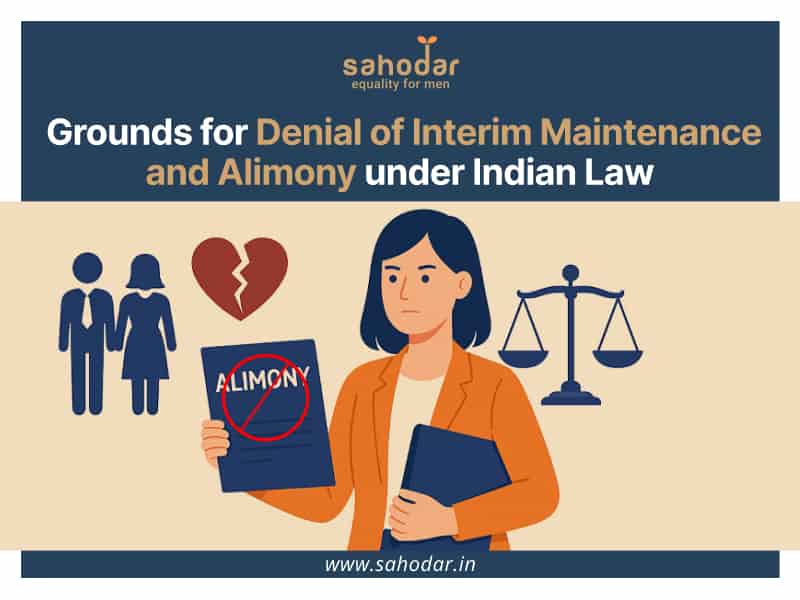In India, the law provides protective measures for spouses, particularly women, through provisions like Section 125 of the Criminal Procedure Code (Cr.P.C.), Protection of Women from Domestic Violence Act, 2005 (PWDV Act), and Hindu Marriage Act, 1955 (HMA). These statutes allow aggrieved parties to seek interim maintenance, permanent alimony, and monetary relief. However, these provisions are not absolute and come with certain conditions, restrictions, and grounds for denial. Below are the detailed legal grounds under each relevant provision.
Denial of Interim Maintenance under Section 125 Cr.P.C.
Section 125(1) provides maintenance to a wife, minor children, and parents. However, Section 125(4) of the Cr.P.C. explicitly provides three grounds for denial:
- Living in Adultery: If the wife is living in adultery, she is automatically disqualified from claiming maintenance. This has been upheld in Rohtash Singh v. Ramendri (2000) 3 SCC 180, where the Supreme Court held that cohabitation with another man disentitles a woman from claiming maintenance.
- Refusal to Live with Husband Without Sufficient Reason: Maintenance can be denied if the wife voluntarily deserts the husband without a valid cause. In Bipin v. Madhurani, the court denied maintenance due to the unjustified refusal to live with the husband.
- Mutual Agreement or Divorce: If the parties have settled the issue or entered into a mutual agreement waiving maintenance, interim relief may not be granted, subject to judicial scrutiny of fairness.
- Earning Wife or Capable of Employment: Courts may deny maintenance if the wife is employed or capable of earning but is deliberately unemployed. The Delhi High Court in Mamta Jaiswal v. Rajesh Jaiswal held that a well-educated and qualified woman who voluntarily stays idle is not entitled to maintenance.
Denial of Maintenance under Section 20 of PWDV Act, 2005
Section 20 allows a Magistrate to direct monetary relief, including maintenance. However, maintenance under this section can be denied under the following legal circumstances:
Absence of Domestic Violence: Section 20 is contingent upon proof of domestic violence as defined in Section 3 of the Act. The court may dismiss the application if the complaint does not disclose a prima facie case.
- Sufficient Income or Assets: Maintenance can be denied if the aggrieved party has sufficient independent income or assets to support herself. The Gujarat High Court, in Snehalata v. Mahendra, denied monetary relief.
- Suppression of Material Facts: The court may deny interim monetary relief if the applicant suppresses her income, previous maintenance awards, or other vital facts.
- Multiple Proceedings for Same Relief: Courts may avoid duplicating monetary relief if the applicant already receives maintenance under another statute, especially if no additional need is proven.
Denial of Interim Relief under Section 23 of PWDV Act
Section 23(1) allows the Magistrate to grant ex parte interim orders. This discretion can be refused under the following grounds:
- Lack of Urgent Need: If the application does not establish imminent need or urgency, interim relief under Section 23 may be denied.
- No Prima Facie Evidence: Interim orders require a prima facie case. If the facts alleged do not amount to domestic violence or if documents contradict the claims, courts may deny relief.
- Delay in Approaching Court: Unexplained or inordinate delay in applying, especially when domestic violence is alleged long after separation, raises credibility issues.
- Pending Civil or Matrimonial Cases: If there are parallel proceedings where relief is already granted, or the DV Act is misused merely to harass the husband, courts may refuse to entertain the application.
Denial of Interim Maintenance under Section 24 of HMA, 1955
Section 24 allows either spouse to seek interim maintenance and litigation expenses during pendency of proceedings. Denial may occur under the following conditions:
- Earning Capacity of Applicant: Maintenance may be denied if the applicant earns enough or has income from rent, business, or property. The court emphasised this factor in Neelam v. Suresh Kumar.
- Misuse of Legal Process: Filing frivolous applications or using the provision to delay or pressurise the other party can lead to rejection.
- Unclean Hands Doctrine: Parties approaching the court must disclose all material facts. Non-disclosure or false statements can lead to denial of relief.
- Wilful Unemployment: If the applicant is qualified, educated, and capable of earning but chooses not to work, the court may hold such conduct against her.
Denial of Alimony under Section 25 of HMA, 1955
Section 25 deals with permanent alimony. The following are valid grounds for denial or discontinuation:
- Remarriage: Section 25(3) states that the court may revoke the permanent alimony order if the wife remarries.
- Adultery or Immoral Conduct: The applicant’s character is relevant. If the wife has engaged in adultery or morally questionable behaviour, courts may deny alimony.
- Financial Self-Sufficiency: Permanent alimony may be denied if the applicant owns property, has a job, or otherwise possesses means to support herself.
- Change in Circumstances: Section 25(2) allows for modification or cancellation of maintenance if either party’s financial or personal situation changes significantly.
Conclusion
While maintenance and alimony are legal entitlements under Indian law, they are not guaranteed. The courts evaluate each case on merit, examining the parties’ conduct, financial status, legal precedent, and statutory framework. The goal is to prevent misuse and ensure that justice is done to both the claimant and the respondent. False claims, suppression of income, or misuse of provisions can lead to rejection of relief, preserving the integrity of the judicial process.

